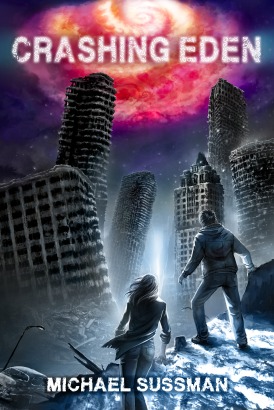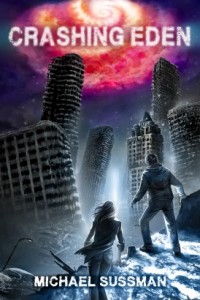Crashing Eden is out!
01 May 2012 4 Comments
in Crashing Eden Tags: Crashing Eden, e-book, paperback, release date
I’m pleased to announce that the e-book releases today. The paperback will soon be available as well.
Like most novels, this one has its flaws. Like most works of art, the finished product pales in comparison to the original vision.
Still, I’m genuinely happy with the book and feel proud to have written it.
I’d like to be one of those authors who ignores reviews, but I’m incapable of such restraint. Reading negative reviews can be tough, of course, but I take comfort in noting that all my favorite novels have plenty of 1-star reviews on Amazon.
Anyhow, I’m looking forward to feedback from followers of this blog. And I’m looking forward to starting a new project!
Cover Reveal!
13 Apr 2012 11 Comments
in Crashing Eden Tags: Cover, Crashing Eden
 The front cover of my soon-to-be-published novel has arrived. Pretty cool, no?
The front cover of my soon-to-be-published novel has arrived. Pretty cool, no?
I’d love to hear any feedback, especially about the lettering (which can still be altered.)
Favorite Quotes on Writing
06 Apr 2012 3 Comments
in Writing Tags: E.L. Doctorow, favorite quotes, Joan Didion, Kurt Vonnegut, Mark Twain, Milan Kundera, quotations on writing, quotes on writing, writing
I like to collect quotations, especially about writing. Here are a few of my favorites:
“Every author in some way portrays himself in his works, even if it be against his will.”
Goethe
“Narrative is the human way of working through a chaotic and unforgiving world.”
E.O. Wilson
“Always try to put the funniest word at the end of your sentence underpants.”
Gene Weingarten
“Writing is a way of talking without being interrupted.”
Jules Renard
“What’s so hard about the first sentence is that you’re stuck with it. Everything else is going to flow out of that sentence. And by the time you’ve laid down the first two sentences, your options are all gone.”
Joan Didion
“A book must be the axe for the frozen sea inside us.”
Franz Kafka
“Remember that writing is translation, and the opus to be translated is yourself.”
E.B. White
“It is not my intent as a writer necessarily to help young readers escape this world we live in so much as to show it as a place imbued with magical potential.”
Tim Wynne-Jones
“He was listening to what I like to call the wisdom of the novel. Every true novelist listens for that suprapersonal wisdom, which explains why great novels are always a little more intelligent than their authors. Novelists who are more intelligent than their books should go into another line of work.”
Milan Kundera
“Only those who risk going too far can possibly find out how far one can go.”
T.S. Eliot
“Writing a novel is like driving a car at night. You can only see as far as your headlights, but you can make the whole trip that way.”
E. L. Doctorow
“I try to leave out the parts that people skip.”
Elmore Leonard
“Writers are troublemakers. A psychotherapist tries to relieve stress, strain, and pressure. Writers are not psychotherapists. Their job is to give readers stress, strain, and pressure. The fact is that readers who hate those things in life love them in fiction”
Sol Stein
“Start as close to the end as possible.”
Kurt Vonnegut
“There are three rules for writing the novel. Unfortunately, no one knows what they are.”
W. Somerset Maugham
“Books are never finished, they are merely abandoned.”
Oscar Wilde
“It took me fifteen years to discover I had no talent for writing, but I couldn’t give it up because by that time I was too famous.”
Robert Benchley
“Fiction writers are by their very nature, middle children—they are searchers, doubters, malcontents. They believe themselves somehow abandoned, uncoddled, unloved.”
John Gregory Brown
“When you catch an adjective, kill it.”
Mark Twain
“Jewish humor uses crazy logic as a way of coping with the incomprehensible.”
Jim Holt
“Writing is the mask and the unveiling.”
E.B. White
“You must stay drunk on writing so reality cannot destroy you.”
Ray Bradbury
“This is not a book that should be tossed aside lightly. It should be hurled with great force.”
Dorothy Parker
Do you have other favorites? Feel free to share them below.
Can’t Wait
03 Apr 2012 4 Comments
in Writing Tags: Ambrose Bierce, Crashing Eden, patience, query, waiting, writing
Who doesn’t hate to wait?
The facial expressions of people in post offices and waiting rooms across the globe tell the story. Waiting is hell.
From childhood onward we’re told to be patient. But as Ambrose Bierce succinctly put it, patience is “a minor form of despair, disguised as a virtue.”
Many jobs and professions entail a good deal of waiting, but perhaps writers have it worst of all.
We query agents and editors, and then wait weeks or months to hear whether we can submit a manuscript. (These days, we may never hear back at all; an increasingly popular policy among these folks is to reply only to queries that interest them.)
If you’re lucky enough to receive an invitation to submit your work, entire seasons may come and go before a response arrives.
And if you’re fortunate enough to receive a contract from a publisher, you’re waiting has just begun; it can easily take two years before your book hits the marketplace.
Currently I’m waiting for an illustrator to complete the cover art for my novel, Crashing Eden. I’m also waiting to hear back from reviewers who have advance copies of the book.
The usual advice writers hear for dealing with this ongoing dilemma is to start work on your next project. Makes sense. Now I just have to wait for my damn muse to get in the mood…
What is Visionary Fiction?
28 Mar 2012 21 Comments
in Writing Tags: Crashing Eden, literary genres, new age, spirituality, Visionary Fiction
When I first heard the term visionary fiction, what came to mind were such literary giants of the past as Dante, Milton, Goethe, Blake, and Whitman. Each of these authors bent toward the future, envisioning a human race struggling to evolve toward a higher spiritual plane.
Two of my favorite twentieth century writers, Nikos Kazantzakis (Zorba the Greek, Saint Francis, The Last Temptation of Christ) and Hermann Hesse (Siddhartha, Narcissus and Goldmund, Steppenwolf, The Glass Bead Game) were firmly in this tradition. Their novels portray protagonists who are striving to reach a more enlightened state of being.
Only recently have I discovered that visionary fiction is resurfacing as a “new” literary genre. In collaboration with fellow authors Shannon Sinclair, Jodine Turner, Saleena Karim, and Sandy Nathan, I’ve joined a Visionary Fiction Web Ring, and invite other novelists to become involved.
So what exactly is visionary fiction?
Perhaps the most cogent answer I’ve come across is from author Michael Gurian, who defines the genre as “fiction in which the expansion of the human mind drives the plot.”
According to Gurian, what moves the story along in visionary novels are such things as visions, hallucinations, mystical experiences, paranormal abilities, channeling, precognitive dreams, eerie coincidences, profound insights, and a feeling of being “utterly at one with the world.”
Visionary fiction overlaps with several better established genres, such as science fiction, fantasy, magical realism, and new age fiction. What seems to be unique about visionary fiction is its focus on the expansion and evolution of the human mind, imagining new frontiers for the human spirit.
Although I didn’t set out to write visionary fiction, my forthcoming novel—Crashing Eden—seems to meet all of the relevant criteria. Still, the story ultimately defies categorization in that it can also be read as a tongue-in-cheek send-up of both organized religion and new age mysticism.
The last word goes to that quirky comedian and philosopher, Steven Wright, who said: “I was a peripheral visionary. I could see the future, but only way off to the side.”
“Where do you get your ideas?”
16 Mar 2012 5 Comments
in Writing Tags: access your unconscious, creative process, writing fiction
Like other writers of fiction, I’m frequently faced with that inevitable question: “Where do you get your ideas?”
My usual reply: Sal’s Literary Ideas & Auto Parts in South Boston. Sure, Sal’s prices are steep. But you can’t beat his 30-day warranty.
Joking aside, the ability to fabricate stories from thin air seems mysterious to readers, who are understandably curious about the nature of the creative process. Unfortunately, for the most part, we authors are just as clueless as everyone else!
My favorite quote regarding this topic is from Pulitzer Prize-winning author, Robert Olen Butler: “Please get out of the habit of saying that you’ve got an idea for a short story. Art does not come from ideas. Art does not come from the mind. Art comes from the place where you dream. Art comes from your unconscious; it comes from the white-hot center of you.”
The key to writing good fiction is to access your unconscious. For some, this comes naturally. Others, like me, must coax the muse out of hiding. This is best done, in my experience, by entering into the twilight state between waking and dreaming. Walking, jogging, communing with Nature, taking a hot bath, daydreaming, and meditating can all help.
If all else fails, you may want to purchase my Whack-a-Plot™ kit, or my revolutionary product, Brano™. As the ad says: Out with the clichéd phrases and stale storylines, and in with the brilliant epiphanies!

Recent Comments